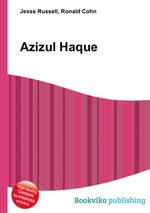Azizul Haque
Jesse Russell Ronald Cohn
бумажная книга
High Quality Content by WIKIPEDIA articles! Azizul Haque (also Azizul Hacque , Khan Bahadur Qazi Azizul Huq, Quazi Syed Azizul Haque was a police officer of British India who worked with Edward Henry to develop the Henry Classification System of fingerprints. Haque, reportedly, provided the mathematical basis for the system. Haque was born in 1872 in the village of Paigramkasba, Fultala (Phultala), in the Khulna division of Bengal, now Bangladesh. His parents reportedly died in a boat accident when he was young. According to family history, Haque left his family home at age 12, as a result of "altercation" with his older brother, and went to Kolkata, where he befriended a family who became "impressed" with his mathematical skills and arranged for him to get a formal education. According to Beavan, Henry recruited Haque as a police sub-inspector to work on the fingerprint project at the recommendation of the Principal of Calcutta Presidency College, where Haque studied math and science, and thus Haque began his career in Bengal Police Service. Once professionally established, Haque visited his brother from whom he was estranged as a run-away boy, and as the family story goes, the brother was over joyed and promptly arranged Haque to marry his cousin (which was an accepted custom among Muslims in Indian subcontinent). Haque subsequently opted to join the Bihar Police Service when Bihar was separated from the Bengal Presidency. Upon retirement from service, he settled in Motihari in Bihar province of India, where he died and was buried there. He had eight surviving children. His wife, and the children and their families migrated to East Pakistan and West Pakistan during partition of India, and presently their descendants are settled in Bangladesh, Pakistan, UK, Australia and North America.


